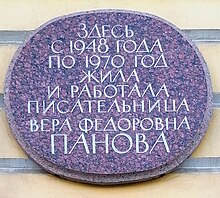Vera Feodorovna Panova
Vera Panova ( Russian Вера Фёдоровна Панова ., Scientific transliteration Vera Fedorovna Panova * 7. jul. / 20th March 1905 greg. In Rostov-on-Don , † 3. March 1973 in Leningrad ) was a Russian novelist and screenwriter.
Life
She was forced to drop out of school due to the untimely death of her father, a bank clerk. Her mother, a bookseller, could not afford her daughter's education and so Wera Panowa had to do further training as an autodidact. At the age of seventeen she began to work as a journalist for various newspapers and magazines in Rostov.
In 1937 she and her family left Rostov and moved to Ukraine . At the beginning of the Second World War she lived in the city of Pushkin . When the city was captured by the Germans, she was arrested and deported to a concentration camp . However, she managed to escape and return to Ukraine. In 1940 she moved to Leningrad . During the Second World War she worked in Perm for press and radio. Between 1948 and 1970 Panova lived and worked in a former barracks building on the edge of the Marsfeld in what was then Leningrad.
She published her first drama Ilja Kosogor in 1933; however, it was not very successful. She then began to devote herself to poetry , the feature section and narration in addition to theater plays , and this with extraordinary success.
Her experiences at the front formed the basis of her first novel Sputniki (Eng. "Comrades"), which was first published in 1947. She also received the Stalin Prize for this novel .
The drama Wojennoplennyje, which originated in 1942 and was edited again in 1957 and published under the title Metelitsa (Snowstorm), describes the behavior of Soviet people in war, partly in captivity. This drama takes a critical look at racism and nationalism.
Wera Panowa's works are particularly up-to-date and have been translated into more than 50 languages.
Works (selection)
- Sputniki , 1946 (German comrades , Verlag Tagelschau, Berlin 1947, or companions , Zsolnay, Berlin (among others) 1948)
- Wojennoplennyie (Metelitsa) , 1942, 1957 (snow storm)
- Krushilicha , 1947 (German people from Krushilicha , Verlag Kultur und Progress, Berlin 1949)
- Wremena goda , 1953 (seasons)
- Sentimentalny roman , 1958 (German: At 17 you're young , Verlag Kultur und Progress, Berlin 1960, or Sentimentaler Roman , Langen (among others), Munich 1960)
- Serjosha , 1955 (Ger. Little man in a big world. Stories from the life of a very young boy , Verlag Kultur und Progress, Berlin 1956)
- Walja und Wolodja , 1959 (German Leningrad Stories , Verlag Kultur und Progress, Berlin 1962)
- Maltschik i dewotschka , (boy and girl)
literature
- Nadeshda Ludwig (ed.): Handbook of Soviet literature (1917–1972) . 1st edition. Bibliographisches Institut, Leipzig 1975, Panowa, Vera Fjodorowna, p. 389 ff .
Web links
- Literature by and about Wera Fjodorowna Panowa in the catalog of the German National Library
- Biography on peoples.ru
- Biography on krugosvet.ru
- Russian website with directory of Panoiwa's scripts
| personal data | |
|---|---|
| SURNAME | Panova, Vera Feodorovna |
| ALTERNATIVE NAMES | Панова, Вера Фёдоровна (Russian); Panova, Vera Fëdorovna (scientific transliteration) |
| BRIEF DESCRIPTION | Russian writer |
| DATE OF BIRTH | March 20, 1905 |
| PLACE OF BIRTH | Rostov on Don |
| DATE OF DEATH | March 3, 1973 |
| Place of death | Leningrad |
